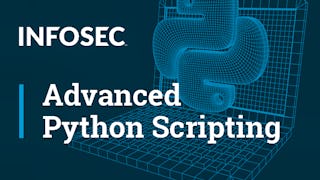Updated in May 2025.
This course now features Coursera Coach! A smarter way to learn with interactive, real-time conversations that help you test your knowledge, challenge assumptions, and deepen your understanding as you progress through the course. This comprehensive course covers advanced web security exploits, Python scripting for ethical hacking, and network attacks, preparing learners for the most sophisticated cybersecurity challenges. By understanding SQL injection, utilizing Python for automation, and mastering key penetration testing tools, you’ll be equipped to assess, exploit, and protect web applications, systems, and networks. Through real-world applications, the course also explores Python’s role in ethical hacking, enabling you to script customized tools and automate attacks. The course begins with SQL fundamentals, where you’ll explore databases, relational structures, and SQL commands, laying a foundation for SQL injection techniques. You'll learn how to exploit common SQL injection vulnerabilities, including methods to retrieve passwords, database names, and full datasets. After mastering SQL injection, we dive into essential website penetration testing tools like sqlmap and ZAP, which automate vulnerability detection and help you conduct comprehensive security assessments on web applications. Python scripting is a major focus, where you’ll build a solid understanding of data types, structures, control statements, and functions in Python. Using this knowledge, you will develop custom scripts for ethical hacking, automate tasks like network scanning, and create tools to identify and exploit vulnerabilities. Additionally, the course explores advanced topics such as AI hacking and large language models (LLMs), offering unique approaches to manipulating AI systems and executing prompt injections. This course is suitable for intermediate learners in cybersecurity and penetration testing who are familiar with basic network concepts and web security. It’s perfect for those interested in pursuing certifications such as CEH or OSCP. Python and scripting knowledge is encouraged, but the course offers beginner-level content in Python to help you build the necessary skills.


















